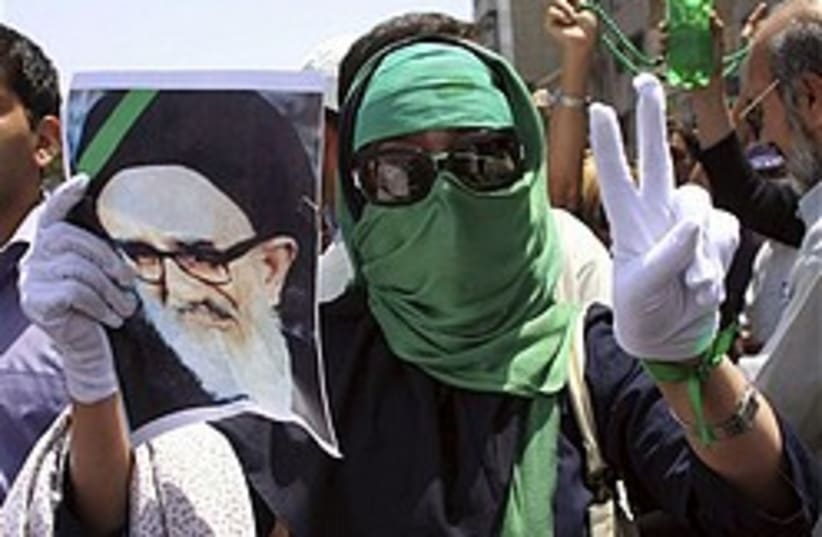The Iranian opposition has turned to top clerics in the holy Shi'ite city of Qom to help put an end to the Islamic regime's violent crackdown on post-election protests, reaching out to the only group that could come out against the country's supreme leader.
In a letter sent Saturday, the reformists compared the regime's ruthless crackdown to that of the late shah of Persia, remembered in the country for his brutal secret police, with one opposition leader even saying that the tactics employed by government forces were worse than those used by the Israelis against the Palestinians.
Iran's opposition maintains that President Mahmoud Ahmadinejad stole the June 12 elections from opposition leader Mir Hossein Mousavi by engaging in massive fraud, but its demonstrations have been ruthlessly suppressed leaving hundreds, if not thousands, in prison.
The opposition has been hampered by the firm backing given the president and his election win by the country's supreme leader, Ayatollah Ali Khamenei, who in Iran's Islamic republic has the final say in all state matters.
A possible counterweight to Khamenei's wide-ranging powers, however, is the moral authority of nine clerics in the holy city of Qom that are "marja' taqlid," or sources of emulation for Iran's Shi'ites.
Traditionally, these clerics, who have huge spiritual influence over Iranians, have stayed out of Iran's religious-based politics and they routinely congratulated each winner of the presidential election.
This time, however, only one has done so, while three others have spoken out against the violent crackdown against the hundreds of thousands of opposition supporters who took to the streets to protest the alleged election fraud.
Mousavi, who claims he won the election, former president Mohammad Khatami and 67 other prominent reformists sent a letter to the clerics saying authorities have held protesters and activists without charges and have used torture to extract confessions.
"We call on you, the marja' taqlid ... to remind the relevant authorities of the damaging consequences of employing unlawful methods and warn them about the spread of tyranny in the Islamic republic system," said the letter, a copy of which was made available to The Associated Press.
Mahdi Karroubi, a signatory to the letter and a candidate in the election, sent a missive of his own to Iran's intelligence chief describing the crackdown on protesters as worse than the treatment of the Palestinians at the hands of the Israelis.
"Everyone has seen how women have been beaten with batons and thrown to the ground - this is worse than what the Zionist criminals are doing to the oppressed Palestinian people," he wrote in his letter addressed to intelligence chief Gholam Hossein Mohseni Ejehi.
Karroubi's accusation is particularly potent because Iran's regime frequently focuses on the plight of the Palestinians and often condemns Israel's policies in the territories.
Even as these letters were sent Saturday, hundreds of Iranians gathered in north Teheran's Vanak and Mirdamad districts and chanted "death to the dictator" and "we want our vote back" before they were attacked and beaten by police and pro-government militia.
Witnesses told the Associated Press that the rare demonstration was a response to demonstrations around the world in solidarity with Iranians imprisoned in the crackdown.
As night fell, Iranians across the city gathered on their rooftops and chanted "death to the dictator" and "courageous neighbors, thank you for your support."
While the rooftop chanting had been common feature in the immediate aftermath of the elections, it had largely disappeared in recent weeks.
At least 20 people in Iran were killed in clashes between security forces and protesters following the election, according to police, though rights groups fear the number could be much greater.
Authorities still hold hundreds of people they arrested following the protests, including some top leaders of the reform movement - many of them detained in secret locations.
Khamenei and his supporters have tried to depict the protesters as tools of foreign countries trying to spark a revolution to topple Iran's Islamic system
The US and other Western countries have denied the allegations, but Iran's semiofficial media has reported in recent weeks that prominent opposition activists have confessed to provoking riots to topple the regime.
Intelligence chief Ejehi said earlier this week that some of the confessions would be broadcast on state television.
The reformists criticized the regime's actions in the letter they sent to the clerics, saying "they have resorted to illegal, immoral and un-Islamic methods to obtain confessions."
"What legal, Islamic or human rights code can justify the repeated torture of those who live under the banner of Islam?" it said.
The letter said the repressive methods used to obtain confessions were reminiscent of the methods employed by Iran's former shah, who was toppled by the 1979 Islamic Revolution.
"The only way out of this situation is to release all detainees and put an end to the security state imposed after the election," it said.
Meanwhile Ahmadinejad appointed his former vice president, Esfandiar Rahim Mashai, as an adviser and the head of his office. Khamenei had ordered the president to dismiss Mashai after the latter made statements that could be construed as friendly towards Israel.
